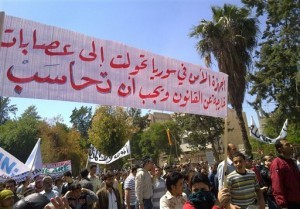Revenge or Reform: What Will Become of Syria’s Feared Security Agencies?

During the past two years, thousands of Syrians have seen the inside of the Syrian government’s torture chambers and secret holding cells. Due to the fearsome reputation of the Syrian security and intelligence bodies, these places were only whispered about, and never seen, by most Syrians prior to the uprising.

Now, thousands of Syrians have been detained by the security forces; human rights groups allege that these detentions have involved the abuse and murder of detainees. This, in turn, has sparked fears of mass reprisals and revenge killings should the regime fall.
There have already been a number of alleged cases of revenge and reprisal against the security forces, although the circumstances surrounding them are very difficult to verify. For example, in early March of this year, opposition gunmen allegedly executed members of the Military Intelligence Directorate, one of the Syrian government’s many intelligence agencies. Likewise, many Syrians fear a backlash against the Alawite community as a whole, due to the fact that members of President Bashar al-Assad’s sect make up the backbone of the security apparatus.
These concerns coincide with increasing reports by local and international human rights organizations documenting violations committed by opposition fighters against their prisoners. Amnesty International recently accused the Syrian opposition of subjecting prisoners to torture and sometimes killing them. The organization also accused opposition fighters of failing to distinguish between Syrian government soldiers, pro-regime militia personnel and civilians.
These allegations raise questions about the possibility of reforming the security forces in post-conflict Syria so as to eliminate abuse by both existing government security bodies and opposition fighters who might someday be incorporated into official security institutions.
Opposition activist and former Dean of the Faculty of Public Administration at the Arab International University Zaidoun Zouabi says that it is possible to reform the security services in a post-conflict Syria. This reform should be accomplished through a restructuring that aims to dismantle the current security networks.
“Implicated officials should be removed and the rest moved to the army,” he suggested. “They should be replaced by leaders with a sense of patriotism. This should take place in conjunction with a broader movement to [break up] units and introduce others from the army.”
Zouabi believes the Interior Ministry should be restructured in a post-conflict Syria, and that the ministry should control all security services and play a significant role in filling leadership positions and, later, monitoring recruitment.
The Syrian security and intelligence apparatus is divided into four independent branches: State Security (also referred to as General Intelligence), Political Security, Military Intelligence and Air Force Intelligence. These units are in turn subdivided into 17 subsections.
Some activists who were tortured at the hands of the security forces do not believe the current system can be reformed.
Mahmoud, a 31 year-old anti-government activist spent a combined ten months in prison, more than half of them in solitary confinement, after being arrested in 2011 and 2012 by Syria’s Military Intelligence for filming demonstrations. He requested his last name not be published for fear of reprisals. During his time in prison, Mahmoud was beaten, cut off from the outside world and prevented from even seeing the sun. His captors prohibited him from bathing, which led him to become afflicted by skin diseases. He was then barred from receiving medical attention. Despite his suffering, Mahmoud describes his treatment as “excellent” compared to what he saw others endure: torture so severe it often led to death or permanent disability.
“The security services in Syria are incapable of reform, period, because they are loyal only to the leader, not to the homeland,” he said.
Last October, some Syrian opposition figures organized a workshop titledReforming the Security Forces under the umbrella of a conference on the administration of the transitional period in Syria held in Istanbul. The workshop was attended by defected army and security officers of the Syrian regime.
The statement issued at the end of the workshop proposed that the post-conflict transitional period should include a “solution” for the issue of the security forces. Intelligence figures should be encouraged to report abuse and secret records should be opened and violators – from security agents to judges – should be held accountable for their actions.
The report also stated that building confidence in the transitional phase requires “preventing the rebels from seeking reprisals against the perpetrators of massacres and killings.”
“Perpetrators should be brought to the competent courts to prevent sectarian strife,” the report said.
But while the statement acknowledges the challenges to such a plan, including the likely “emergence of private militias that are difficult to control and refuse to join the transitional government,” it offers little in the way of practical solutions.
Afaq Ahmed, a defector from the Air Force Intelligence branch who worked as an assistant to the branch’s head of special operations, said containing the threat of private militias will require cutting off their support from abroad.
Ahmed stressed the need to hold accountable all those who have committed human rights violations, including members of the Free Syrian Army, adding that the media should be contributing to creating a “culture of co-existence” and “forgiveness of the past.”
Mahmoud, the anti-government activist, said he does not seek revenge against his jailers or the security forces as a whole, emphasizing that only those who commit crimes should be punished.
The new security services, he said, must protect the rights of Syrian citizens, and its agents must realize that “that national security is the security of the citizens.”
